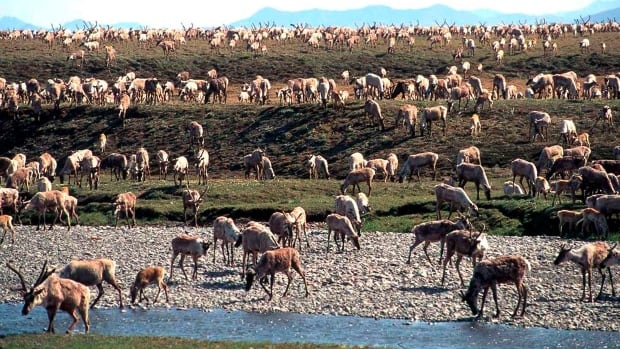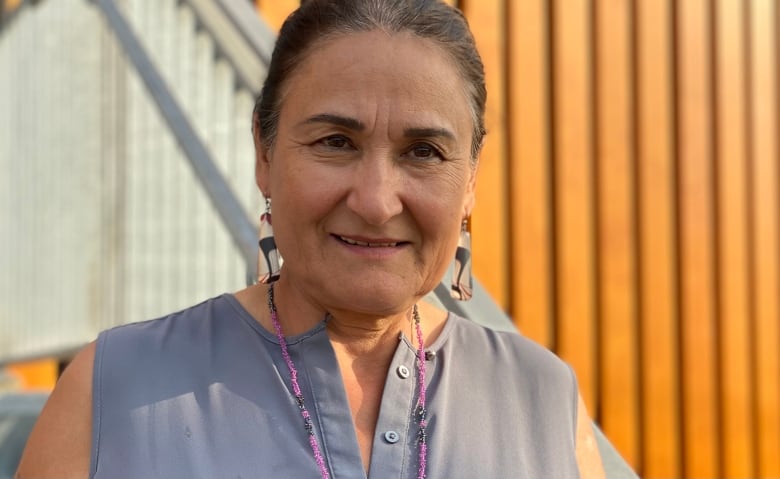
For Gwich’in on both sides of the Canada-U.S. border it’s a major victory, even if it isn’t set in stone.
The Biden administration on Wednesday announced it’s cancelling seven oil exploration leases in the Arctic National Wildlife Refuge, an area that includes the breeding grounds of the Porcupine caribou herd.
Gwich’in people consider the area “the sacred place where life begins.”
“It’s a step in the right direction for this administration to make,” said Bernadette Dementieff, executive director of Alaska’s Gwich’in Steering Committee. “We still have a lot of work to do to permanently protect [the refuge], but I’m really enjoying the news.”
Pauline Frost, chief of the Vuntut Gwitchin First Nation in Old Crow, Yukon, said the decision allows Gwich’in “breathing space” to organize further efforts to put the refuge forever off-limits to oil and gas development, something that would require an act of Congress.
“The entire nation really needs to start partnering with our allies and friends and … stand together and start to use this as an opportunity to send some clear messages to the Biden administration, really to the world, that drilling in the coastal plain cannot proceed,” Frost said. “It just can’t.”

Porcupine caribou numbers are strong, with a recent study estimating a population of around 218,000, which would make the Porcupine one of the largest caribou herds in the world. But Gwich’in and their environmental allies worry that would change if industrial development was to be permitted on the calving grounds.
The seven leases cover an area of nearly 150,000 hectares. They were issued by the U.S. Bureau of Land Management during the dying days of the Trump administration. The state-run Alaska Industrial Development and Export Authority (AIDEA) purchased the leases after major oil players passed.
“What we’ve seen is there’s not a great desire to drill in the Arctic Refuge” by major oil companies, said Chris Rider, national director of conservation with the Canadian Parks and Wilderness Society and a former Yukoner.
“And I think that’s because people know that this is such an important area and they know the impacts it would have. They also know that it’s not a popular decision.”
Lease holder slams decision
In a news release, AIDEA vowed to take the Biden administration’s decision to court. “This latest action by the Department of the Interior shows arbitrary disregard for federal law, based on campaign trail rhetoric. Campaign promises are not enough to justify this agency action.”
The organization representing Alaska’s Iñupiat also slammed the decision. Iñupiat leaders have long supported opening the Arctic Refuge, as well as the National Petroleum Reserve – Alaska, which lies to the west of the refuge, to drilling.
“[Wednesday’s] announcement by the Biden administration to rescind leases in the ANWR and further ‘protect’ 13 million acres of our ancestral homelands flies in the face of our region’s wishes and self-determination,” said Nagruk Harcharek, President of the Voice of Arctic Iñupiat, in a statement.

And Alaska’s Congressional delegation — Democrats and Republicans alike — said they were disappointed by the decision. Alaska political leaders have long pushed to allow oil and gas drilling in the refuge in part because of its economic impact on Indigenous communities in an area with few other jobs.
Alaska Republican U.S. Sen. Dan Sullivan denounced Biden’s actions as the latest volley in what he called a “war on Alaska.”
“I am deeply frustrated by the reversal of these leases in ANWR,” said U.S. Rep. Mary Peltola, a Democrat, using a common shorthand for the refuge.
Dementieff, the Gwich’in Steering Committee chair, said she’s aware this week’s decision could be reversed by a future administration.
“We are continuing to just go out and educate,” she said. “There’s a lot of new Congress members that have commented that we have to continue to go and talk to and get their support, even our own congressional leadership in Alaska.”
“It’s an uphill battle, but it’s the battle that we’re willing to take.”

